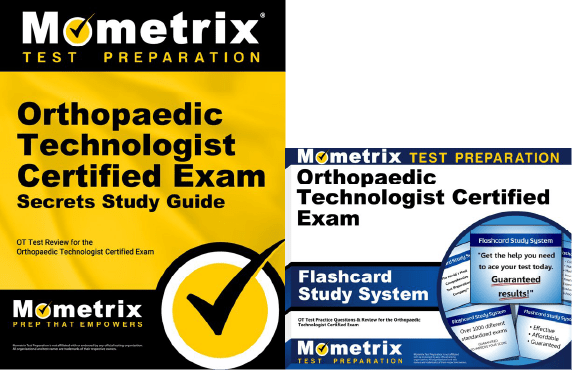If you need help studying for the Orthopaedic Technologist Certified (OTC®) exam or just want some more information about what the test is like, you’ve come to the right place.
Click below to take a free Orthopaedic Technologist practice test!
Exam Eligibility
Before you can register to take the OTC exam, you’ll have to meet the eligibility requirements of ONE of the three routes:
- You need at least 24 months of full-time OT experience
- You need to complete a structured OT program
- You need to be a certified/licensed athletic trainer
If you meet one of these requirements, you’re set to begin the registration process!
What’s on the Exam?
First, let’s talk about the questions on the exam. There are 165 multiple-choice questions total, but only 150 of the questions will count toward your score. Why is that?
The 15 unscored questions on the exam are called “pretest” questions. These are added to the exam to determine if they’re good enough questions to add to future versions of the test.
The trick is that you won’t have any way of knowing which questions are scored and which ones are pretest. They will appear just like the scored questions throughout the test.
The time limit for the exam is 3 hours. There aren’t any scheduled breaks, but you’re free to take restroom breaks as needed.
Let’s take a closer look at the different sections of the OTC exam.
1. Patient Assessment and Management
30% of the exam
- Obtaining complete history of the patient’s complaints and conditions
- Conducting physical examination of the patient
- Types of radiographic studies
- Educating patients about physician protocols, devices, and procedures
- Anatomy and physiology
- Medical terminology
- Common orthopaedic conditions and injuries
- Identifying and responding to emergency situations
2. Office and Clinic Management
10% of the exam
- The foundations of inventory management
- Best practices for maintaining patient privacy and confidentiality
- Established best practices for infection control, sterilization techniques, and universal precautions
- Compliance with regulatory guidelines for safety and hazard management
3. Casting, Splinting, and Orthopaedic Appliances
40% of the exam
- Casting/splinting materials
- Applying upper and lower extremity casts/splints
- Applying specialty casts/splints
- Altering, modifying, and adjusting casts/splints
- Applying and adjusting orthopaedic DMEs for proper placement and fit
- Providing patient education regarding casting, splinting, and orthopaedic appliances
- Responding to orthopaedic complications
4. Clinic and Hospital Surgical Procedures
20% of the exam
- Common orthopaedic surgical procedures
- Positioning, prepping, and draping the patient
- Managing the post-op patient
- Assisting the surgeon physician
- Providing patient education regarding pre- and post-operative care
- Drawing and preparing requested injections
- Collecting and preparing specimens
- Traction
How to Register
Once you’ve ensured that you meet the eligibility requirements, you can register for the exam!
To get started, you’ll need to submit an application on NBCOT’s website. The application will ask you for your contact information and any documentation to prove your eligibility (among other things).
When you submit the application, you’ll also need to submit the $100 application fee.
Once your application is approved, you’ll be able to register for the exam and schedule an appointment, The testing fee is $450.
Exam Scores
The exam is scored using two methods: the Angoff method and scaled scoring.
Here’s how they work:
The Angoff Method
A group of subject-matter experts take an educated guess at the percentage of candidates who would correctly answer each question on the test. These estimates are then averaged to set a cut-off score, which test-takers must meet or exceed to pass. This method aims to ensure the pass threshold reflects the level of knowledge or skill that is deemed minimally acceptable for a particular profession or field.
Scaled Scoring
For every question you answer correctly, you get one point added to your raw score. At the end of the test, your final raw score will be converted to a scaled score. The reason your raw score is converted to a scaled score is because everyone who takes the exam is given a slightly different set of questions. Since everyone has a different arrangement of questions, and because some questions are harder than others, converting your raw score to a scaled score ensures a more even playing field.
Retaking the Exam
If you didn’t get a passing score on your first try, that’s okay! You can retake the test after a 45-day waiting period.
Keep in mind that you will have to pay the full testing fee every time you retake the test.
FAQs
How many questions are on the OTC exam?
The exam contains 165 questions.
What is the time limit for the OTC exam?
The exam is timed at 3 hours.
What is the passing score for the OTC exam?
NBCOT doesn’t make the passing score public, but you should aim to answer at least 70% of the questions correctly.
How much does the OTC exam cost?
The application fee is $100, and the examination fee is $450.
Mometrix Test Preparation is not affiliated with or endorsed by any official testing organization. All organizational and test names are trademarks of their respective owners.



 OTC Study Guide
OTC Study Guide OTC Flashcards
OTC Flashcards